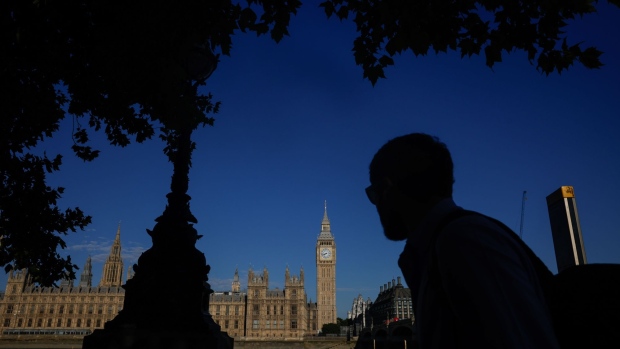Oct 14, 2022
UK Bonds Surge at Open on U-Turn Bets After Week of Market Chaos
, Bloomberg News

(Bloomberg) -- UK bonds and the pound slid to end a tumultuous week, with investors fearful of more turmoil without help from the Bank of England.
Benchmark bonds slumped after Prime Minister Liz Truss confirmed speculation of a U-turn on a planned freeze on corporation tax, after earlier heading for the biggest weekly rally in a decade. The pound also fell more than 1% in an reversal of a surge on Thursday, when those rumors of policy changes took hold.
Next week, debt markets are set to be on their own without the safety net of daily buying by the BOE, which has acted as a backstop for forced sellers. Investors are wondering both how long Truss can last and whether the central bank will have to step in again if there’s further turbulence.
“The pain is not over. The market is rightly concerned on what comes next,” said Hank Calenti, fixed-income strategist at SMBC Nikko Capital Markets Ltd. “The BOE will be there -- the question is whether they do anything.”
Markets are assessing whether the changes will be enough to put the UK’s debt on a sustainable footing, given some unfunded tax cuts are still going ahead. Truss has replaced Kwasi Kwarteng as Chancellor with Jeremy Hunt, who she said shares her “desire for a high-growth, low-tax economy,” and expects there won’t be further reversals in tax policy.
Truss Expects Hunt to Agree No More UK Tax Package U-Turns
It’s “definitely a statement to calm markets -- nice to see it but doesn’t change the fundamentals all too much,” said Jordan Rochester, a currency strategist at Nomura International Plc. “I can imagine this buys Liz Truss a few days -- but if polling remains where it is then it’s the same story, just a delay in the inevitable.”
UK markets have faced turmoil since Kwarteng’s late September mini-budget called for borrowing-fueled tax cuts, which saw voter support for Truss and the ruling party collapse in polls, lenders pull mortgage products and an intervention from the BOE to shore up confidence.
Bank of England’s Emergency Bond Purchases Total £19.25 Billion
The central bank has been buying longer-dated and index-linked gilts to help pension funds facing margin calls in the selloff. After ramping up purchases this week to help drive a market rebound, buying dropped to £1.45 billion on Friday. In the wake of that, 30-year yields rose 23 basis points to 4.78%, reversing a drop of over 30 basis points made earlier.
Market volatility “is not out of the woods yet,” said Tanvir Sandhu, chief global derivatives strategist at Bloomberg Intelligence. A sustained period of market stability is key for investor confidence to return, he said.
“The key question is whether funds will have obtained sufficient liquidity after the increase in recent BOE purchases this week and other actions to weather further yield movements,” wrote David Page, head of macro research at AXA Investment Managers, in a note to clients.
(Updates throughout.)
©2022 Bloomberg L.P.






